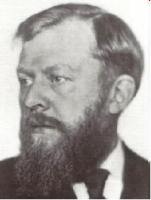Presents
Jan Brandts Buys
|
|
 |
Soundbites courtesy of Steve Jones |
String Sextet in D Major, Op.40
For 3 Violins, 2 Violas & Cello or 2 Violins, 2 Violas & 2 Cellos
The Op.40 String Sextet dates from 1917. The famous chamber music critic Wilhelm Altmann writing in his Chamber Music Handbook describes the works as follows:
“Jan Brandts-Buys is a true musician and, just as his Op.19 String Quartet which I dealt with in an earlier volume, I can recommend this Sextet for both public performance and home music making. It is in no way difficult to play. It deviates from the standard setting for string sextet in that it is for 3 violins, 2 violas and cello. It is well-constructed and finely written. The opening theme of the fleet first movement, Allegro molto, gives the music the feeling of a scherzo. The second theme is particularly effective. The rhythm creates a charming accompaniment and the whole movement is very artistically handled. The main subject of the slow, second movement, Stoltz einherschreitend, is a sweet melody which is eventually replaced with a funereal theme. The often syncopated music is full of rich and charming melodic touches. The Scherzo which comes next is in the form of an old Dutch sailors dance, rhythmically piquant and contrapuntal is quite cleverly done. The powerful finale, Energico e tenuto, is simply magnificent.”
Jan Brandts Buys (1868-1933) came from a long line of professional musicians. His father was an organist in the town of Zutphen in the Netherlands where Jan was born. He studied at the Raff Conservatory in Frankfurt and in 1893 settled in Vienna where he got to know Brahms, who along with Edvard Grieg, praised his early works. His piano concerto won an important international prize and such famous artists as Lilli Lehmann often included his songs on the same program with those of Schubert. He was best known for his comic operas such as The Tailors of Schonau and The Man in the Moon, which gained considerable international acclaim. But he did not ignore chamber music, penning several works various ensembles.
The original edition, long unavailable and which we have reprinted, is for 3 Violins, 2 Violas, and Cello. Marvelous though it is in this setting, it must be admitted that nowadays, this combination is only occasionally assembled. Therefore, we have provided a second cello part in lieu of the third violin so that this wonderful music can now be enjoyed during an evening of string sextets, say by Borodin, Gliere, Rimsky Korsakov and other fine sextets Edition Silvertust offers.
| (A) 3 Violins, 2 Violas, & Cello | $39.95 |
|
| (B) 2 Violins, 2 Violas & 2 Cellos | $39.95 |
|
| (C) All Seven Parts | $47.95 |
|